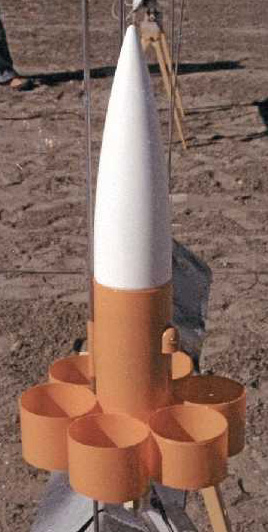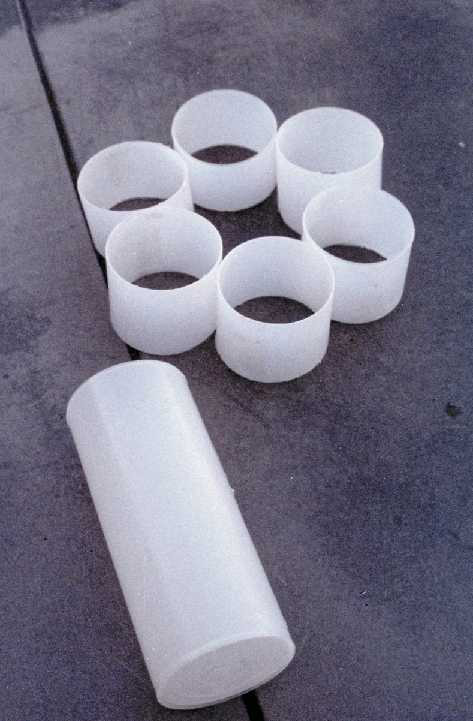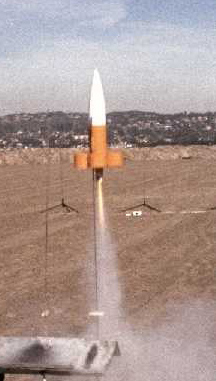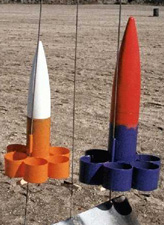Scratch Tea-Bird Original Design / Scratch Built
Scratch - Tea-Bird {Scratch}
Contributed by Larry Brand
| Manufacturer: | Scratch |
| Style: | Ring/Tube/Cone Fin |
 Brief:
Brief:
An all-plastic tubefin for 29mm motors. This tiny (15" tall) and extreme-stubby tubefin was inspired by a plastic container of Crystal Light instant iced tea packets I was looking at one day. Sitting next to it on the pantry was a 2.6" Estes Executioner my kids gave me for Fathers Day last year. I kept looking back and forth at that 2.6" Estes nose cone and the plastic Crystal Light container. "Naaah, it couldn't be the same size". I tried it - absolutely a perfect fit! Without drawing up plans, I built the Tea-Bird from Crystal Light containers as fast as I could cut them up. I was interested in the aerodynamics of extremely short tubefin rockets, so this was a perfect, low-cost test vehicle.
Construction:
Tea-Bird (I don't have to explain the name, right?) is my fourth tubefin built entirely out of plastic. The first two (Fahrenheit 62/5 and F.I.S.H., see EMRR articles) were constructed out of 34mm PVC plumbing conduit. The third, "CORONAry" was made from a plastic cigar tube. Why all-plastic"? Waterproof - I fly from a field on a small island. But its also cheap and strong. I used the 6" iced tea container as the body tube by simply sawing off the bottom. Two more containers were cut into 3 equal 2" pieces to use for the 6 tube fins. To complete the "all-plastic" theme, I hogged the centering rings out of the plastic caps and sawed off bottoms of the plastic containers and laminated them together in triple thickness; in retrospect, this was more trouble than it was worth and 1/8" LOC ply rings would have been fine. Nose cone was borrowed from that Estes Executioner kit I mentioned. I used 5-min. epoxy thoughout, and before gluing anything, I washed all the parts in warm soapy water and gave them a wipe with some old rotgut vodka I use to clean plastic parts; this is to remove plasticizer and manufacturing residue. Also before gluing, the very shiny, smooth surface was roughed with sandpaper to improve the epoxy joints.
 Construction was garden-variety tubefin self-jigging method. First two tube fins were glued onto opposite sides while the body tube rested on a flat surface (In case my wife reads this: "No Dear, it wasn't the dining room table"). I clamped everything between two soup cans to give tight glue joints. Then two more glued onto the top of this assembly, followed by flipping it over (after epoxy set) and gluing on the remaining two. Perfect alignment every time with this method - why I like scratch-building tubefins. Centering rings were glued 1" from the top and 1/2" from the bottom of a 4 5/8" piece of 29mm LOC tubing and the whole motor tube assembly was epoxied into the body tube in the usual way. Launch lug consisted of a 2" piece of BIC pen barrel glued in line with one of the triangular spaces between tube fins, with its center 1 1/2" above the tubefincan (this spot is used as the CG limit, balance must be in front of). Rocket is designed ot fly off 3/16" Maxi-Wire®. Recovery system attachment was with a knot passed through a hole in the hull 2" from the top of the tube, with the knot covered by a piece of a Garcia-Vega cigar tube.
Construction was garden-variety tubefin self-jigging method. First two tube fins were glued onto opposite sides while the body tube rested on a flat surface (In case my wife reads this: "No Dear, it wasn't the dining room table"). I clamped everything between two soup cans to give tight glue joints. Then two more glued onto the top of this assembly, followed by flipping it over (after epoxy set) and gluing on the remaining two. Perfect alignment every time with this method - why I like scratch-building tubefins. Centering rings were glued 1" from the top and 1/2" from the bottom of a 4 5/8" piece of 29mm LOC tubing and the whole motor tube assembly was epoxied into the body tube in the usual way. Launch lug consisted of a 2" piece of BIC pen barrel glued in line with one of the triangular spaces between tube fins, with its center 1 1/2" above the tubefincan (this spot is used as the CG limit, balance must be in front of). Rocket is designed ot fly off 3/16" Maxi-Wire®. Recovery system attachment was with a knot passed through a hole in the hull 2" from the top of the tube, with the knot covered by a piece of a Garcia-Vega cigar tube.
Painting was with Tamiya rattle-can orange. I should mention that it is CRITICAL to paint this rocket, and keep it away from direct sun light except when flying; the "green-conscious" Crystal Light company makes these plastic containers out of HDPE polymer, which prolonged sunlight exposure turns into a nice white enviro-safe powder!
 Flight:
Flight:
First flight was on an Estes D12-3, uisng a LOC 24-29mm adapter. Perfect boost to about 300', followed by perfect recovery on its 24" Top Flight "Lite" chute. It amazes me what a small space these "Lite" chutes fit in to, but lots of dog barf (or a Nomex shield) is essential or they melt from touching any ejection gas. 2nd and 3rd flights were to about the 900-1000' my SIM predicted on AT F21-6 and F23-4 motors; perfect again, despite a good bit of wind. By the next weekend at Fiesta Island, I had gotten pretty cocky with my new toy, so I took advantage of calm conditions to load in an F50-9 (SIM said 1241' at CD estimate of 0.75) and also taped a "parasite" micro altimeter pod to the hull so I could get altitude and Cd data. Oh-boy. Big mistake! Tea-Bird ripped off the pad like a bullet, shedded one of its tube fins and cocked over into horizontal flight, F50-9 still at full power. It headed out over Mission Bay like an air-to-air missile, gliding in a shallow trajectory toward the water. Witnesses on the shore pointed out the landing spot in the bay, noting the parachute popped out about 20 feet above the water. Tea-Bird floated nicely, with plenty of air trapped in the hull and cone. I watched it drift out of sight downwind as it bobbed toward the opposite shore. Got in my car and drove to where it seemed to be heading. No sign of Tea-Bird. Did it sink? Then I noticed a small crowd gathered near the Hilton Hotel beach. I ran over there, and sure enough, Tea-Bird beached with its chute like a big, orange jellyfish! What's more, the Perfectflite MicroAlt was beeping out "peeppeeppeeppeep..." to 486' (height before it cocked to horizontal)! I was lucky somebody didn't call Homeland Security! Amazingly, when I opened the altimeter pod, out came a flood of water, followed by a very wet altimeter, still chirping. These things are amazing! I pulled the battery, rinsed MicroAlt with some bottled water, and it is still works great today! No More F50s. The maximum rated power for Tea-Bird is the F20-F21-F23-F24-F25 series. I have since flown it on E30-4 motors, and that is a great combination, too; gives about 600', very wind-resistant.
Summary:
PRO: Cheap and fast to build from free parts (well, you do need to buy the cone, the 2.6 LOC cone can be used). Power limited to 29mm F20-F25, and 24mm motor tube can be used too, although F21s are not too available now. Very wind resistant, and of course, W-A-T-E-R-P-R-O-O-F!
CON: Risk of cracking the plastic tubefins if flown off hard desert playa or the like. I do have to keep reminding myself to store Tea-Bird in a paper bag at the field to minimize sunlight damage.
 Other:
Other:
I have enjoyed Tea-Bird so much that I have built a 4"x25" version for 38mm motors up to I287SS (which flies superbly), and a monster 5.5"x36" version for 54mm motors up to K445 (to fly at June 2008 ROCStock). I am using them to compare performance of large, "stubby" 6-tube vs. 7-tube tubefin designs; some surprising results so far, contruction articles will eventually be submitted to EMRR. These will wrap up my 5 year tubefin research project (mostly published recently in SPORT ROCKETRY and ROCKETS).
Other Reviews
- Scratch Tea-Bird By Jewel B. Butler Jr. (September 27, 2009)
Brief: This rocket is a replic of the great rocketeer Larry Brand designed called the Tea Bird. Got the idea off the EMRR web site. The rocket is a tube-fin stubby that flies really nice and is relatively cheap to build. I started with three container that my Sugar-Free KoolAid comes in, a Bt-80 nose cone fits perfectly as Mr Brand stated in the Tea Bird article. Got the balsa nose cone from ...
 |
 |
Steve Lindeman (November 24, 2012)
Being a tea toddler my self this really caught my attention. H-m-m-m-m-m-m. Crystal Light containers you say. I'll never see them the same again.
 |
 |
Rich DeAngelis (December 3, 2011)
Great story of the flight!